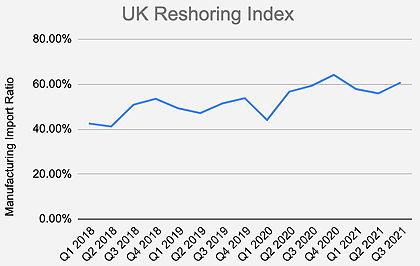UK imports from Asia have soared despite the Covid pandemic

The UK has become more reliant on imports from low-cost countries in Asia over the past four years, despite the supply chain disruptions caused by the Covid-19 pandemic, according a new analysis It reveals that manufactured goods imports from low-cost countries in Asia represented 61% of the UK manufacturing sector’s gross output in the third quarter of 2021 – compared to 43% in the first quarter of 2018.
The figures come from the Industrial Policy Research Centre (IPRC) – a collaborative venture between the Manufacturing Technology Centre (MTC) and Loughborough University – which has established a “UK Reshoring Index” which analyses UK manufacturing output and import data from 14 Asian low-cost countries (LCCs), to track whether the UK is reshoring manufacturing back from Asia.
The rise in the index’s manufacturing import ratio (MIR) – indicating a lower level of reshoring – continues a decades-long trend as globalisation and the free movement of goods have led to British companies relocating their production overseas, and consumers have become more reliant on manufacturing goods produced in low-cost countries.
The analysis shows that UK manufacturing output has yet to recover from its 2018 levels. In the third quarter of 2021 – the latest data available – the figure was 3% lower than Q1 of 2018. According to the IPRC, growth was chiefly hampered by the pandemic, which put a variety of strains on the UK manufacturing sector. Tough lockdown measures forced many factories to close in March 2020, with hundreds of thousands of workers being placed on furlough – in April 2020 alone, the figure was 911,000. As a result, manufacturing output declined by a third during the first two quarters of 2020.
Output was hit again as new Covid variants emerged. During the spread of the Alpha variant towards the end of 2020, manufacturing firms reported high levels of worker absences. Output fell by more than 5% in Q1 2021, the only quarterly decline since the start of the pandemic.
The UK became increasingly reliant on imports to make up for this drop in output. This is reflected in the index: during 2020, the MIR rose from 44% to 64%.
The IPRC data shows that imports from Asia have been “remarkably resilient”. From Q1 2018 to Q3 2021, the volume of imports from LCCs increased by 39%. For Chinese imports alone, the growth was 67%. This held up during the pandemic, despite shocks in global supply chains.
While imports from Asian countries fell temporarily during the first year of the pandemic, volumes recovered faster than the UK’s manufacturing output. Reasons suggested for this include: the pandemic starting earlier in Asia; resilience in the region from previous pandemics such as SARS; and strict measures that prevented further Covid outbreaks. As a result, Asian countries were able to meet increased demand when the UK needed it.

This analysis comes as the IPRC releases its Manufacturing Strategy, outlining steps to boost the UK’s manufacturing output and ensure that the sector is future-proofed for decades to come.
“Our analysis shows that the UK continues to be too reliant on manufacturing imports from Asian low-cost countries,” says MTC CEO Dr Clive Hickman, who also chairs the IPRC. “We must lead a renaissance in UK manufacturing with a renewed focus on jobs, skills and resilience to encourage the reshoring of industry.
“These efforts begin with a National Manufacturing Strategy to ensure that the sector is future-proofed for the decades to come,” he adds. “Focusing on building stronger links between academia and industry, boosting devolved powers to create regional industrial strategies and providing a specific funding pot for net-zero manufacturing will boost the UK’s industrial capabilities, improve productivity and deliver thousands of green jobs for the future.“
IPRC: Twitter





